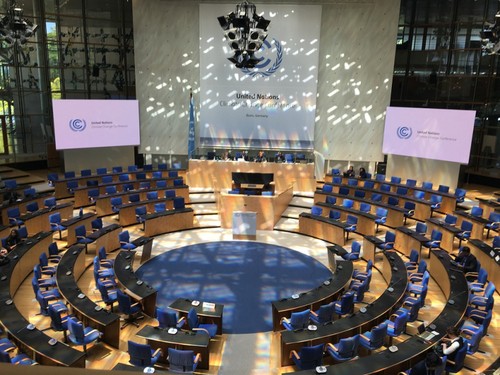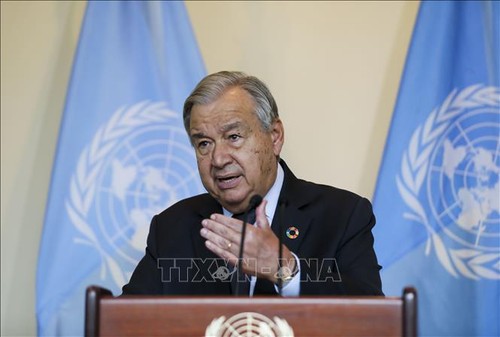 The UN Conference on climate change in Bonn, Germany (Photo: Euronews) The UN Conference on climate change in Bonn, Germany (Photo: Euronews) |
Focus on climate finance goals
The 10-day conference in Bonn is the only annual forum on climate change organized by the UN Framework Convention on Climate Change. 6,000 delegates from 198 countries and territories and representatives of international organizations will assess the progress in implementing climate commitments agreed at COP28 last year in Dubai and build an agenda for COP29.
A key topic at the Bonn Conference will be climate finance, specifying the goals, scale, and mechanism of financial contributions – whether grants or loans – from developed countries to developing countries to help them respond to climate change.
Clearly defining the goals and mechanisms of climate finance at the Bonn conference will increase the chance of reaching a new agreement on climate finance at COP29, amid growing concerns about commitment.
"New grants and highly concessional forms of finance to developing countries must be coupled with global financial reforms that deliver debt relief and affordable finance, and finding new and innovative sources of finance outside of the process. We must also move towards better carbon markets. Getting these markets to work can unlock more funding for national climate plans,” Simon Stiell, Executive Director of the UN Framework Convention on Climate Change, said.
Another topic will be the World Bank-managed Loss and Damage Fund put into operation at COP28, which remains controversial because developed countries are not obliged to contribute. Many developing countries believe that makes the Fund ineffective.
The Bonn conference will organize a final round of the "Glasgow Dialogue" begun at COP26 in 2021 in Scotland, on preventing, minimizing, and handling loss and damage due to climate change. Participants hope to reach agreement on a more comprehensive and legally binding mechanism.
Another priority of the Bonn conference is to integrate national commitments made at COP28 on phasing out fossil fuels into the Nationally Determined Contributions (NDC). Countries are expected to submit new NDCs to the UN early next year.
 UN Secretary-General Antonio Guterres (Photo: XNA/VNA) UN Secretary-General Antonio Guterres (Photo: XNA/VNA) |
Accelerating efforts to phase down fossil fuels
Pressure to accelerate the phase-down of fossil fuels has been increased by new scientific studies indicating that the earth is continuing to heat up at an alarming rate.
A new report by the World Meteorological Organization said there is an 80% likelihood that the annual average global temperature will temporarily exceed 1.5 degrees Celsius above pre-industrial levels in at least one of the next five years, which will exceed the target set by countries in the 2015 Paris Agreement of holding global warming to 1.5 degree or less by the end of this century.
The EU’s Copernicus climate monitoring agency said last month that May was the hottest month ever recorded and the 12th consecutive month breaking the record.
On Wednesday UN Secretary-General Antonio Guterres called on the world to stop advertising fossil fuels and, at the same time, accelerate the phase-down of fossil fuels, the main cause of the greenhouse effect and global warming. Guterres said holding global warming below 1.5 degrees Celsius is vital.
“The difference between 1.5 and two degrees could be the difference between extinction and survival for some small island states and coastal communities. The difference between minimizing climate chaos or crossing dangerous tipping points. 1.5 degrees is not a target. It is not a goal. It is a physical limit,” said Guterres.
Climate experts say that even if carbon emissions reach zero now, climate change will still cause at least 38 trillion USD per year in damage by 2050. That’s much more than the 2.4 trillion USD that would be needed to get developing countries to abandon fossil fuels and adapt to global warming by 2030.